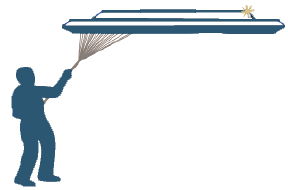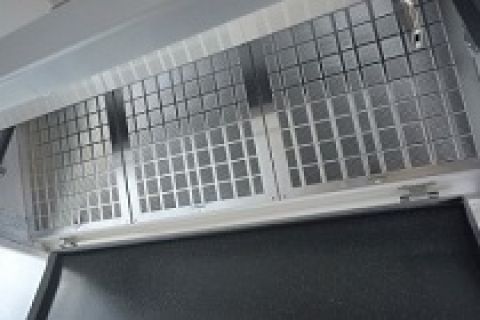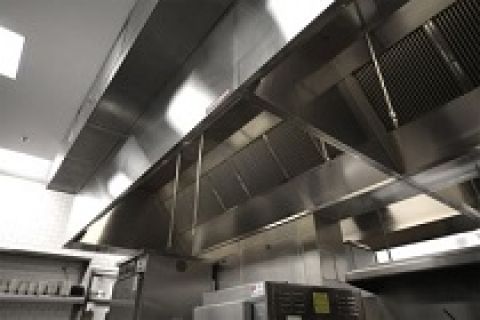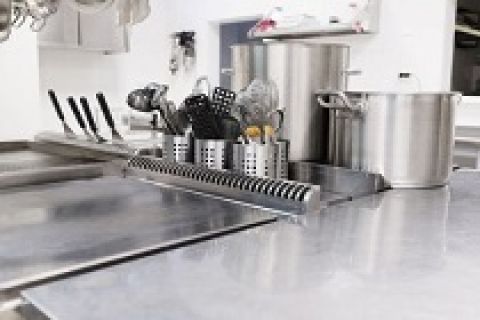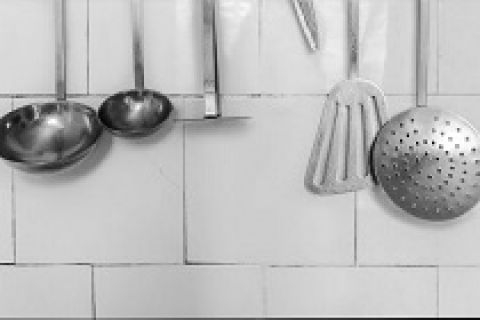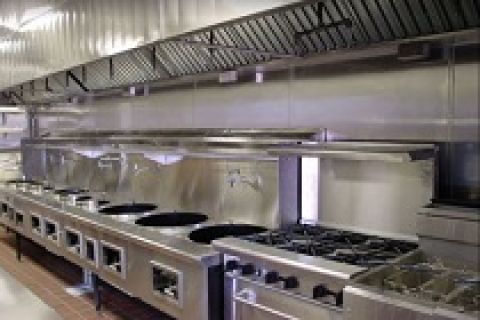5 Critical Signs Your Commercial Hood System Needs Maintenance | APS-Hoods
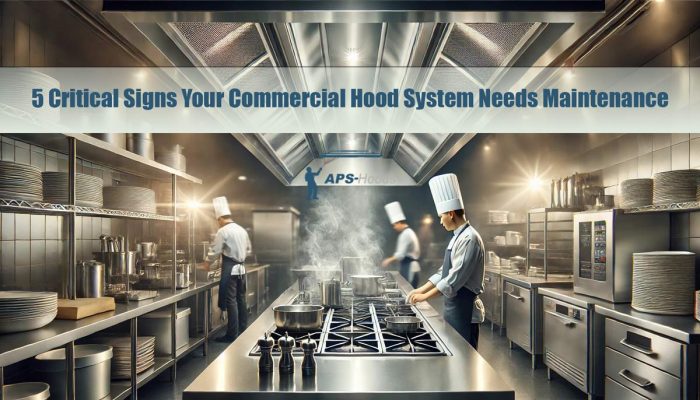
As a restaurant owner, you know your business’s heart is your kitchen. In a commercial kitchen environment, the hoods and ventilation systems have a direct impact on the health and quality of the service.
Given the fact that hood systems are active for long hours and are exposed to a large amount of oil and grease, regular maintenance becomes non-negotiable. In this article, we are going to go through some of the more alarming signs. These signs can adversely affect your staff’s health and impose heavy repair costs if ignored.
Ensure Your Kitchen’s Safety and Efficiency Today! Don’t wait until small issues turn into costly repairs or hazards. Don’t risk your kitchen’s safety Call APS-Hoods at 800-750-7313 to schedule your next service.
What Is a Commercial Hood System?
A commercial hood system is the unsung hero of any professional kitchen, working tirelessly behind the scenes to ensure a safe and pleasant environment. This vital piece of equipment is a comprehensive ventilation system designed to remove airborne contaminants, grease particles, and unpleasant odors from your kitchen. It plays a pivotal role in maintaining the air quality, safety, and overall ambiance of your restaurant.
By extracting smoke, heat, and grease-laden vapors, a commercial hood system prevents the buildup of harmful pollutants and minimizes fire hazards. Whether you’re running a bustling fast-food outlet or a fine dining establishment, this system is indispensable for compliance with health and safety standards.
Key Indicators Commercial Hood System
The typical commercial hood system includes several interconnected parts, each serving a crucial function:
- Exhaust Hoods:
These are the primary components of a commercial hood system, designed to capture airborne particles, grease, smoke, and odors directly above cooking surfaces.
How It Works: Positioned over stoves, fryers, or grills, the exhaust hood collects rising heat, smoke, and grease vapors before they spread into the kitchen.
Importance: Prevents airborne grease and contaminants from settling on surfaces, maintaining a clean and sanitary kitchen environment.
Maintenance Tips: Clean the hood surfaces daily and schedule professional deep cleaning to remove hidden grease deposits.
- Grease Filters:
Grease filters are installed within the hood to trap grease particles before they enter the ductwork.
How It Works: These metal or mesh filters capture grease from the air as it passes through the hood, preventing clogging in the duct system.
Importance: Reduces fire risks and ensures smoother operation of the ventilation system.
Maintenance Tips: Clean filters weekly or replace them if they become damaged or overly clogged.
- Ductwork:
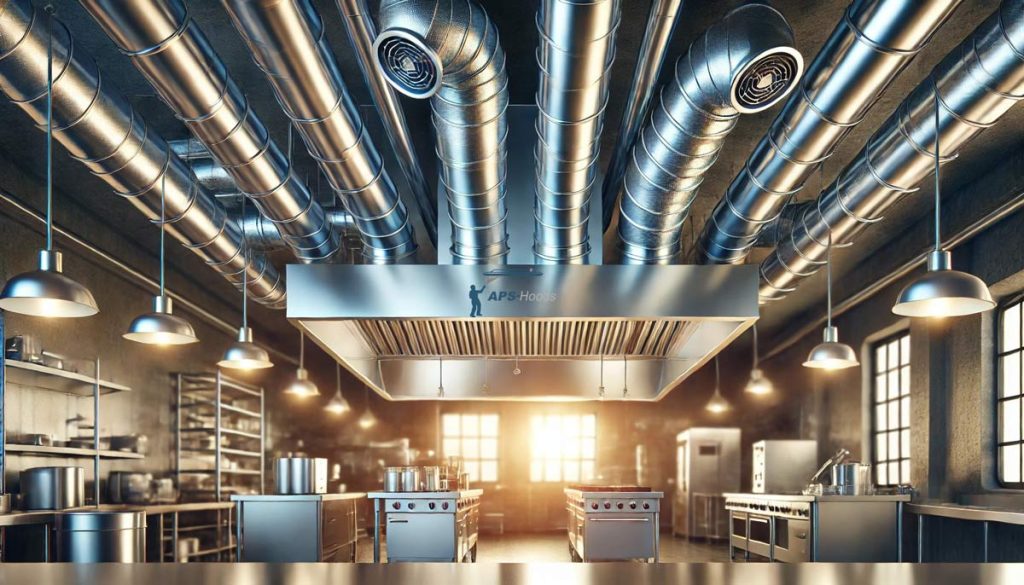
The ductwork channels contaminated air from the exhaust hood to the outside of the building.
How It Works: This network of metal ducts carries smoke, heat, and airborne contaminants to an outdoor exhaust outlet, maintaining indoor air quality.
Importance: Properly installed and maintained ducts prevent grease buildup, which can lead to fire hazards.
Maintenance Tips: Schedule periodic inspections to check for grease buildup or damage inside the ducts.
- Exhaust Fans:
Exhaust fans create the suction that pulls smoke, odors, and grease particles out of the kitchen through the hood and ducts.
- How It Works: Located at the end of the duct system, exhaust fans use powerful motors to expel air outside the building.
- Importance: Ensures efficient ventilation and prevents stale air from circulating in the kitchen.
- Maintenance Tips: Check fans for unusual noises or vibrations and have them professionally cleaned and lubricated regularly.
- Fire Suppression Systems:
Fire suppression systems are integrated into commercial hood systems to extinguish fires quickly and minimize damage.
How It Works: When a fire is detected, these systems release a chemical agent or water mist to suppress flames in the hood and cooking areas.
Importance: Essential for compliance with fire safety regulations and protecting your staff and property.
Maintenance Tips: Test fire suppression systems regularly to ensure they’re functional and refill or replace agents as needed.
- Makeup Air Units:
Makeup air units supply fresh air into the kitchen to replace the air removed by the hood system.
- How It Works: These units balance air pressure by introducing clean, filtered air into the kitchen.
- Importance: Prevents negative air pressure, which can hinder the ventilation system’s performance and affect kitchen comfort.
- Maintenance Tips: Inspect and clean air filters and check airflow balance regularly.
Why Is It Important?
Without a fully operational hood system, your kitchen can quickly become a hazard zone. Poor ventilation not only jeopardizes the health of your staff but can also tarnish your restaurant’s reputation. Customers are unlikely to return to an establishment plagued by persistent odors or poor air quality. Additionally, failure to maintain your hood system could lead to hefty fines or even closures due to non-compliance with local regulations.
Learn More About Commercial Kitchen Cleaning
For a more in-depth guide on maintaining your commercial kitchen, don’t miss our resource: Ultimate Restaurant Cleaning Checklist | Denver, CO | APS Hoods. This checklist provides actionable steps to keep your kitchen clean, compliant, and efficient.
What Are the Main Signs Your Commercial Hood System Needs Immediate Service?
Your commercial hood system works tirelessly to keep your kitchen safe and efficient. Over time, it can encounter issues due to constant exposure to heat, grease, and smoke. Recognizing the warning signs early can save you from costly repairs, fire hazards, and operational downtime. Below are five critical signs that indicate your hood system needs immediate attention:
1. Unusual Odors or Persistent Smoke in the Kitchen
Lingering smoke or foul odors in your kitchen are more than just a nuisance—they’re a clear warning sign of a malfunctioning hood system. These issues not only create an unpleasant environment for customers and staff but can also indicate clogged filters or ventilation inefficiencies that need immediate attention.
Why Does It Matter?
Odors and smoke in a restaurant are a recipe for disaster. Studies show that over two-thirds of customers will not return to an establishment if they experience unpleasant smells. Beyond customer dissatisfaction, this issue poses health risks to your staff, who are exposed to poor air quality daily.
What to Do?
Inspect your hood system for interruptions, excessive noise, or visible grease buildup. If the problem persists, it’s time to schedule a professional inspection and cleaning service.
2. Excessive Grease Buildup on Surfaces or Filters
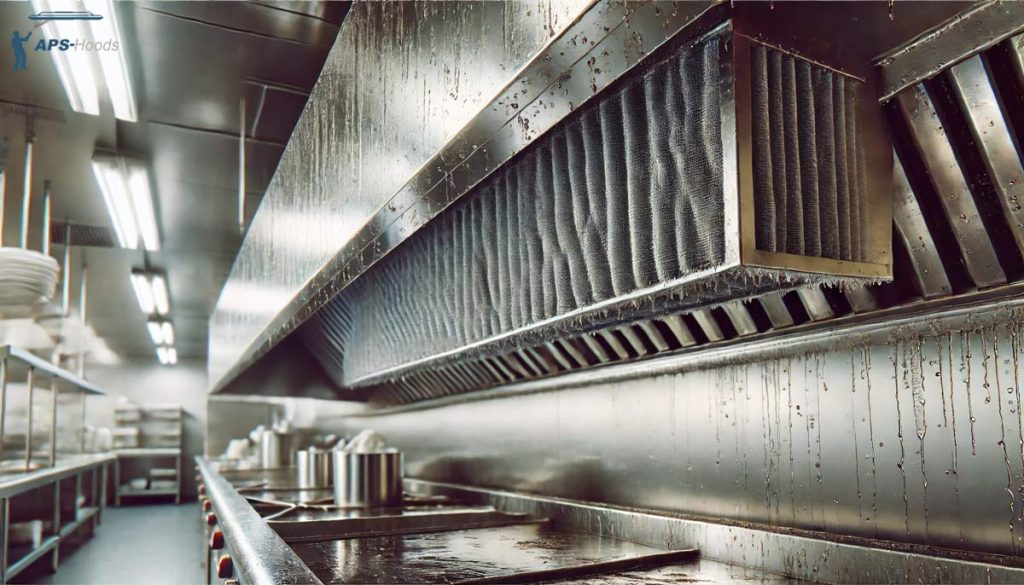
Heavy grease buildup on kitchen surfaces or hood filters is another sign of trouble. Grease buildup doesn’t just look bad—it’s a ticking time bomb for your kitchen!
Why Does It Matter?
When grease clogs filters and accumulates in your hood system, it reduces ventilation efficiency and increases the risk of fire. Left unchecked, it can cause severe damage to your equipment.
What to Do?
Regular cleaning and filter replacements are essential to maintaining your system. If grease buildup is excessive, contact a professional service to ensure a thorough cleaning.
3. Unusual Noises or Vibrations from the Exhaust Fan
Excessive noise or vibrations from your exhaust fan often indicate mechanical issues or imbalanced components in your hood system.
Why Does It Matter?
These issues can stem from blockages or wear-and-tear on internal parts. If ignored, the damage can escalate, leading to expensive repairs or even system failure.
What to Do?
Schedule a professional inspection to identify and address the source of the problem. Regular maintenance can prevent minor issues from escalating into costly breakdowns.
4. Decreased Ventilation Efficiency or Airflow
If your kitchen feels stuffy or your hood system is struggling to remove smoke and odors, reduced ventilation efficiency could be the culprit.
Why Does It Matter?
Inefficient ventilation compromises air quality, increases energy consumption, and affects your staff’s productivity and well-being. It can also result in non-compliance with health and safety regulations.
What to Do?
Discuss any noticeable changes in airflow with your cleaning and maintenance team. Regular inspections and tune-ups are critical to keeping your hood system operating efficiently.
5. Frequent Triggering of Fire Suppression Systems
If your fire suppression system activates repeatedly without cause, it could be due to poorly maintained hoods and ventilation systems.
Why Does It Matter?
False alarms disrupt kitchen operations, inconvenience customers, and may even result in unnecessary expenses for resetting or replacing fire suppression equipment.
What to Do?
Ensure your hood system is cleaned and inspected regularly. Professional maintenance services can address the root cause of false alarms and prevent future disruptions.
The Advantages of Regular Commercial Hood Maintenance
Maintaining your commercial hood system isn’t just a good practice—it’s a necessity for a safe, efficient, and compliant kitchen. Regular maintenance goes beyond routine cleaning and offers a range of benefits that can directly impact your restaurant’s operations and bottom line. Here’s why you should prioritize hood maintenance:
1. Enhanced Fire Safety
One of the most critical benefits of regular hood maintenance is the reduction of fire hazards. Grease and oil buildup in hoods, filters, and ductwork are leading causes of kitchen fires.
- Why It Matters: Regular cleaning minimizes the risk of grease fires, protecting your staff, patrons, and property.
- How It Helps: Professional cleaning services remove flammable grease deposits that could ignite under high heat.
2. Improved Air Quality
A clean hood system ensures proper ventilation, keeping the kitchen environment comfortable and safe.
- Why It Matters: Poor air quality can affect staff health and customer experience. Lingering smoke and odors can drive customers away and harm your reputation.
- How It Helps: Proper airflow removes smoke, heat, and odors, creating a pleasant environment for everyone in your establishment.
3. Increased Equipment Lifespan
Investing in regular maintenance can extend the life of your hood system and its components.
- Why It Matters: Replacing damaged or poorly maintained equipment is far more expensive than maintaining it.
- How It Helps: Clean, well-maintained hoods, filters, and fans operate more efficiently, reducing wear and tear.
4. Energy Efficiency
A well-maintained hood system uses less energy to perform its functions.
- Why It Matters: Grease-clogged filters and inefficient airflow force your ventilation system to work harder, driving up utility costs.
- How It Helps: Regular cleaning keeps the system running efficiently, lowering energy bills and reducing your carbon footprint.
5. Regulatory Compliance
Health and safety codes require restaurants to maintain clean and functional hood systems. Non-compliance can lead to fines or even temporary closures.
- Why It Matters: Failing inspections can disrupt operations and tarnish your reputation.
- How It Helps: Routine maintenance ensures compliance with local regulations, giving you peace of mind during inspections.
6. Reduced Downtime
Neglecting hood maintenance can lead to unexpected breakdowns, disrupting kitchen operations and service.
- Why It Matters: Downtime means lost revenue and dissatisfied customers.
- How It Helps: Preventative maintenance reduces the risk of equipment failure, keeping your kitchen running smoothly.
7. Cost Savings
While regular maintenance requires an upfront investment, it saves money in the long run by avoiding costly repairs and replacements.
- Why It Matters: Emergency repairs and equipment replacements can quickly drain your budget.
- How It Helps: Preventative maintenance is a cost-effective solution that minimizes expensive surprises.
Make Hood Maintenance a Priority
By scheduling regular maintenance for your commercial hood system, you can ensure a safer, healthier, and more efficient kitchen. Don’t wait for issues to arise—take a proactive approach to protect your business and staff.
Frequently Asked Questions Regarding Hood Maintenance
1. What is a commercial hood system, and why is it important?
A system that removes smoke, grease, heat, and odors to ensure safety, cleanliness, and compliance with regulations.
2. How often should I clean my commercial hood system?
Daily for surfaces; professional cleaning every 3–6 months.
3. What are the warning signs that my hood system needs maintenance?
Smoke, odors, grease buildup, unusual noises, reduced airflow, or frequent fire suppression triggers.
4. Can a clogged grease filter cause a fire?
Yes, grease buildup increases fire risk, making regular cleaning essential.
5. What is the role of ductwork in a commercial hood system?
It channels air outside, ensuring proper ventilation and reducing fire hazards.
6. Why is it essential to maintain the exhaust fan?
A functional fan ensures proper airflow and prevents ventilation inefficiency.
7. What are makeup air units, and do I need them?
They replace removed air, preventing negative pressure and improving kitchen comfort.
8. How does regular maintenance save money?
It prevents costly repairs, extends equipment life, and improves energy efficiency.
9. What happens if I ignore hood system maintenance?
Fire risks, poor air quality, breakdowns, and regulatory fines.
10. How can APS-Hoods help with my hood system maintenance?
We provide expert cleaning and maintenance to ensure safety and compliance. Call 800-750-7313.
Schedule Professional Hood Maintenance Today!
APS-Hoods offers expert cleaning and maintenance services tailored to your restaurant’s needs. With our help, you can enjoy all the benefits of a clean and fully functional hood system. Contact us in Denver, CO to request a free estimate today!
Prioritize Your Kitchen’s Safety and Efficiency
Ignoring these warning signs can lead to more significant issues, including fire hazards, equipment damage, and revenue loss. Stay proactive by scheduling regular inspections and cleanings with APS-Hoods.
Decreased Ventilation Efficiency or Airflow: A Red Flag for Your Commercial Hood System
When your commercial kitchen begins to feel stuffy, smoky, or unusually warm, it’s often a clear indication that your hood system’s ventilation efficiency is compromised. Over time, grease buildup, wear and tear, and clogged components can significantly reduce airflow, affecting the overall functionality of your kitchen’s ventilation system.
Why Does It Matter?
Decreased ventilation efficiency is more than just a comfort issue—it’s a critical safety and operational concern. Here’s why you can’t afford to ignore it:
- Impact on Air Quality: Poor airflow reduces the removal of smoke, grease particles, and odors, leading to a hazardous environment for your staff and patrons.
- Increased Energy Costs: A struggling ventilation system requires more energy to function, driving up utility bills.
- Health Risks: Prolonged exposure to poor air quality can negatively impact the health and productivity of your kitchen staff.
- Regulatory Compliance: Many health and safety codes require restaurants to maintain adequate ventilation. Failure to comply could result in hefty fines or even temporary closure.
What to Do?
Addressing ventilation inefficiency promptly can save you from escalating issues. Here’s a step-by-step approach:
- Schedule Routine Inspections: Regularly check your hood system for grease buildup, clogged filters, or worn-out components.
- Invest in Professional Cleaning Services: Periodic deep cleaning of the hood, filters, and ductwork can restore optimal airflow and prevent further complications.
- Upgrade or Replace Components if Needed: If your ventilation system is outdated or damaged, consider replacing it with a newer, more efficient model. Consult professionals to ensure compatibility and compliance.
- Monitor Ventilation Performance: Keep track of airflow quality and energy usage to identify any recurring inefficiencies.
Preventative Maintenance: The Key to Efficient Ventilation
Don’t wait for airflow issues to disrupt your kitchen operations. Preventative maintenance not only ensures consistent ventilation but also extends the lifespan of your commercial hood system. APS-Hoods offers professional cleaning and maintenance services tailored to your restaurant’s unique needs.
Pro Tip: Ask your maintenance team to evaluate ventilation efficiency during each cleaning session and address any noticeable trends of declining airflow.
Tags: hood cleaning denver
Trackback from your site.
